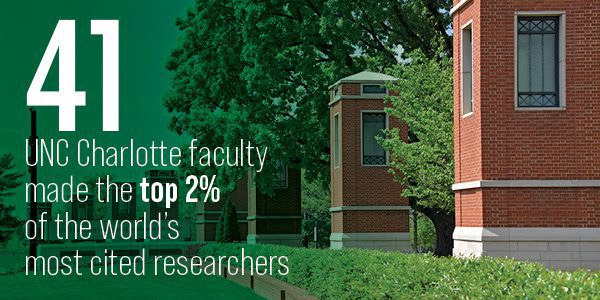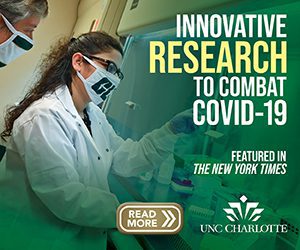UNC Charlotte researchers recognized among world’s top 2%

Top 2%
A recent Stanford University study recognizes the top 2% of the world’s most cited researchers. In all, 41 researchers affiliated with UNC Charlotte made the list.
 The report, first published in the PLOS Biology Journal, evaluated and ranked approximately seven million scientists across disciplines throughout the span of their work years through 2019.
The report, first published in the PLOS Biology Journal, evaluated and ranked approximately seven million scientists across disciplines throughout the span of their work years through 2019.
Based on a series of metrics, including the career-long citation impact of their published research, the database is among the most comprehensive global faculty-evaluation resources ever produced.
“The influential work of the researchers cited in Stanford University’s report reflects UNC Charlotte’s long history of exemplary and discipline-leading research,” said Joan Lorden, provost and vice chancellor for Academic Affairs. “Their inclusion among the world’s top researchers is well-deserved; the University takes pride in the contributions they are making to their fields.”
See the full list of UNC Charlotte faculty recognized below.
Research Highlights
 Through a $20 million grant, the National Technical Assistance Center on Transition for Students and Youth with Disabilities at UNC Charlotte will continue to assist community partners to implement practices that help students with disabilities graduate equipped for success in postsecondary education and employment.
Through a $20 million grant, the National Technical Assistance Center on Transition for Students and Youth with Disabilities at UNC Charlotte will continue to assist community partners to implement practices that help students with disabilities graduate equipped for success in postsecondary education and employment.
 UNC Charlotte is one of several institutions nationwide to invest in campus-based wastewater testing as a mitigation tactic. This effort helped to signal the emergence of potential clusters of positive coronavirus individuals several days in advance of the results of the first clinical diagnosis. Their work was featured in this New York Times piece.
UNC Charlotte is one of several institutions nationwide to invest in campus-based wastewater testing as a mitigation tactic. This effort helped to signal the emergence of potential clusters of positive coronavirus individuals several days in advance of the results of the first clinical diagnosis. Their work was featured in this New York Times piece.
 New research out of the department of sociology on gender inequality indicates that fewer leadership prospects in the workplace apply even to women who show the most promise early on in their academic careers. The social scientists discovered that men supervise more individuals in the workplace than women, regardless of their grade point averages (GPAs) in high school.
New research out of the department of sociology on gender inequality indicates that fewer leadership prospects in the workplace apply even to women who show the most promise early on in their academic careers. The social scientists discovered that men supervise more individuals in the workplace than women, regardless of their grade point averages (GPAs) in high school.
 The 2020 State of Housing in Charlotte report, released by the Childress Klein Center for Real Estate (CKCRE)—ranked among the top-20 most active research institutions in real estate for the past decade, provides data-driven analysis of housing in Charlotte’s eight-county region. The report outlines the strengths and challenges affecting the fast-growing Charlotte housing market.
The 2020 State of Housing in Charlotte report, released by the Childress Klein Center for Real Estate (CKCRE)—ranked among the top-20 most active research institutions in real estate for the past decade, provides data-driven analysis of housing in Charlotte’s eight-county region. The report outlines the strengths and challenges affecting the fast-growing Charlotte housing market.
 The Energy Production and Infrastructure Center (EPIC) was one of 10 institutions nationwide to receive support from the U.S. Department of Energy Solar Energy Technologies Office to improve the resilience and reliability of the regional energy grid. This $3.6 million award is part of a collaborative effort to develop an advanced microgrid control architecture.
The Energy Production and Infrastructure Center (EPIC) was one of 10 institutions nationwide to receive support from the U.S. Department of Energy Solar Energy Technologies Office to improve the resilience and reliability of the regional energy grid. This $3.6 million award is part of a collaborative effort to develop an advanced microgrid control architecture.
Check out more innovative research at UNC Charlotte.
Cross-campus recognition
UNC Charlotte faculty members featured are from colleges and departments across the University; the majority of those named currently teach and conduct research for UNC Charlotte. (UNC Charlotte’s School of Data Science (SDS) reported University faculty members on the list from various University colleges who conduct interdisciplinary research through SDS.)
UNC Charlotte researchers and their primary fields of research cited as among the world’s top 2% are:
Belk College of Business
- Franz W. Kellermanns,Management
- Moutaz Khouja, Business Information Systems and Operations Management
- Dongsong Zhang, Business Information Systems and Operations Management
- Lina Zhou, Business Information Systems and Operations Management
The William States Lee College of Engineering
- Lee W. Casperson, Emeritus/Electrical and Computer Engineering
- Chen Chen, Electrical and Computer Engineering
- Badrul Chowdhury, Electrical and Computer Engineering
- Ahmed El-Ghannam, Mechanical Engineering and Engineering Science
- Christopher Evans, Mechanical Engineering and Engineering Science
- Raphael Tsu, Emeritus/Electrical and Computer Engineering
- Qiuming Wei, Mechanical Engineering and Engineering Science
- Jiang Xie, Electrical and Computer Engineering
- Yong Zhang, Electrical and Computer Engineering
College of Liberal Arts & Sciences
- Ishwar Aggarwal, Physics & Optical Science
- Vasily Astratov, Physics & Optical Science
- Steve Bertz, Chemistry
- Glenn Boreman, Physics and Optical Science
- Kenneth Bost, Biological Sciences
- Lawrence Calhoun, Emeritus, Psychological Science
- Mark Clemens, Biological Sciences
- Patricia Fall, Geography & Earth Sciences
- Nathaniel Fried, Physics & Optical Science
- Greg Gbur, Physics & Optical Science
- Tsing Hua Her, Physics & Optical Science
- Michael Klibanov, Mathematics & Statistics
- Larry J. Leamy, Biological Sciences
- Ian Marriott, Biological Sciences
- James Oliver, Biological Sciences
- Richard Tedeschi, Emeritus, Psychological Science
- Jean-Claude Thill, Geography & Earth Sciences
- Robert Tyson, Emeritus, Physics & Optical Science
College of Computing and Informatics
- Jiangping Fan, Computer Science
- John Gero, Computer Science
- Mary Lou Maher, Software & Information Systems
Cato College of Education
- Diane M. Browder, Special Education & Child Development
The Graduate School
- Thomas L. Reynolds, Plant Biology & Botany